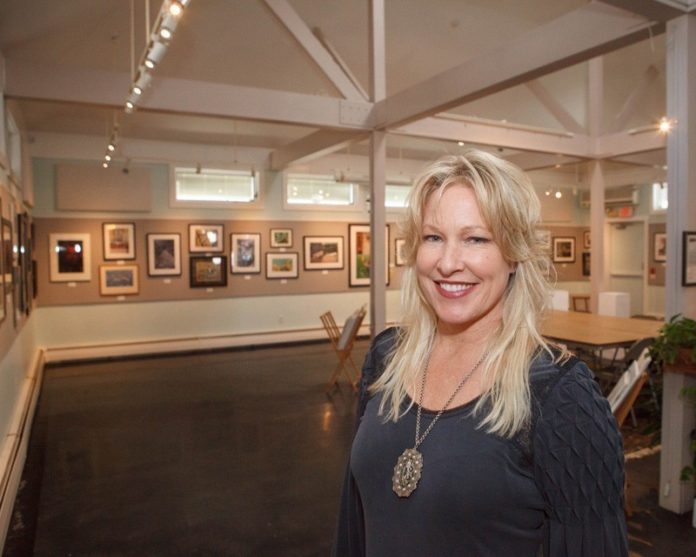
After thousands of visitors left the Wickford Art Festival and artists packed up their remaining works and their income from pieces sold, the Wickford Art Association used to have to send someone around collecting the 7 percent tax on sales made during one of the state’s most well-known fine art festivals.
“A lot of times people don’t have their sales added up yet, so they have to send it to you,” said Sarah Tallarico, executive director of the art association, which sponsors the festival.
“Sometimes we have to track people down,” she said. “Some artists are ready to pay at the end of the festival, but collecting that tax just didn’t make us seem friendly to artists.”
There won’t be any making the rounds to collect sales tax from artists at the close of the two-day 52nd Wickford Art Festival in July 2014.
That’s because Rhode Island becomes more artist-friendly on Dec. 1, when the entire state becomes the first in the nation to have a statewide arts district, a status approved by the General Assembly in July that allows an exemption from the 7 percent sales tax on original works of art.
“I know we’re the first state in the country to have a statewide arts district, because I’m on the board of the National Assembly of State Arts Agencies, and I work closely with my colleagues in other states,” R.I. State Council on the Arts Executive Director Randall Rosenbaum said.
“This is going to position Rhode Island as a destination for the arts,” said Rosenbaum. “It’s an incentive for an arts-buying public to come to Rhode Island to buy art and while they’re here, to spend a lot of money to help our economy.”
The arts-buying public is a valuable segment of travelers that the state arts council will target in overall marketing efforts in collaboration with regional marketing organizations, said Rosenbaum.
“Cultural tourists are the most desirable kind of tourists,” Rosenbaum said. “Studies have found that people who travel for cultural reasons tend to spend more, on average, than other kinds of tourists. They tend to stay longer, so they spend more money on hotels, restaurants and things like drinks after performances and other purchases.”
The statewide arts district comes after years of piecemeal approval by the General Assembly that eventually allowed nine cities and towns to have the sales tax-exemption on original art, beginning with downtown Providence in 1997, Pawtucket in 1999 and then Little Compton, Newport, Tiverton, Warren, Warwick, Westerly and Woonsocket.
“I think it’s going to be a fantastic thing for us. We have a lot of people who come here from other states in the summer, and they like to buy art in Rhode Island and bring it home with them,” said Tallarico. “Sometimes we don’t make a sale because of the tax. They say, ‘You charge tax on art here?’ We’ve heard this many, many times.”
The sales-tax-free designation may also encourage more artists to live or set up shop in North Kingstown or other parts of Rhode Island that have not had arts districts, she said.
“When people are looking to make a living in fine art, they move to those places that are friendly to artists. It’s hard enough to earn a living in lots of businesses now, but especially in fine arts,” said Tallarcio. “When there’s trouble in the economy, one of the first things that goes is the sale of fine art.
“If you really want to encourage economic growth, you really need to take the tax burden down,” she said.
Seven percent may not seem like much on a small purchase, but it can be an annoyance. For example, the Wickford Art Association did a “Poetry and Art” project with works of fine art created to go with specific poems, exhibited and put together in a book that sells for $25 as a fundraiser to help support the Rhode Island Community Food Bank.
“On the night of the opening, people came with cash, and when they bought the book for $25, they were surprised that they had to scramble for change to pay the tax,” she said. “It’s better if they can just give us $25 and be done with it.”
Some of the changes won’t be over and done that easily, such as determining what qualifies as “original art” and makes it eligible for a sales tax exemption.
A painting is pretty clearly a work of original art.
A book published by a major publisher and sold in a bookstore would not qualify for the exemption, but a self-published book signed by the author and sold at a book-signing would qualify, said Rosenbaum.
“The exemptions are issued by the Division of Taxation, and they will consult with us to determine who is a legitimate artist,” said Rosenbaum. “The decisions won’t be for arbitrary or capricious reasons, but for reasons rooted in the language of the law.”
Said R.I. Tax Administrator David M. Sullivan, “We’re tax experts, we’re not art experts, so we’re going to be working closely with the State Council on the Arts to determine what original works are.”
The Division of Taxation is offering several seminars for tax preparers on changes in state tax regulations that take effect in 2014, and the arts district regulations are a main topic.
Up until now, the Division of Taxation has granted sales tax exemptions to about 120 artists, with an increase obviously expected with the statewide designation, said Sullivan.
The Division of Taxation posted details Nov. 8 for Regulation SU 13-143, titled “Sales and Use Tax: Exemption of Sales by Writers, Composers and Artists.”
The regulation defines a “work” as “an original and creative work, whether written, composed or executed for ‘one-of-a-kind or limited-edition production’ in categories that include a book or other writing, a play, a musical composition, a sculpture, traditional and fine crafts, the creation of a film, the creation of a dance or a painting, print, photograph or other like picture.”
While the General Assembly’s Senate and House Fiscal Office Reports for the budget that was enacted for fiscal 2014 projected an $875,000 reduction in revenue as a result of the tax exemptions from the statewide arts district, many in the state don’t see the exemptions, overall, as a loss.
“I think it says a lot for our state. We’re bringing in people to shop for world-class art,” said Sullivan. “The more tourists we bring in, the better for the state.
“I think it’s better that now we’ll have a statewide arts district, instead of picking and choosing different towns,” said Sullivan. “Now it’s the whole state and it levels the playing field.” •













Wickford certainly can use this benefit because it is located in North Kingstown, one of the most backward, unprogressive places I have had the misfortune to live in.